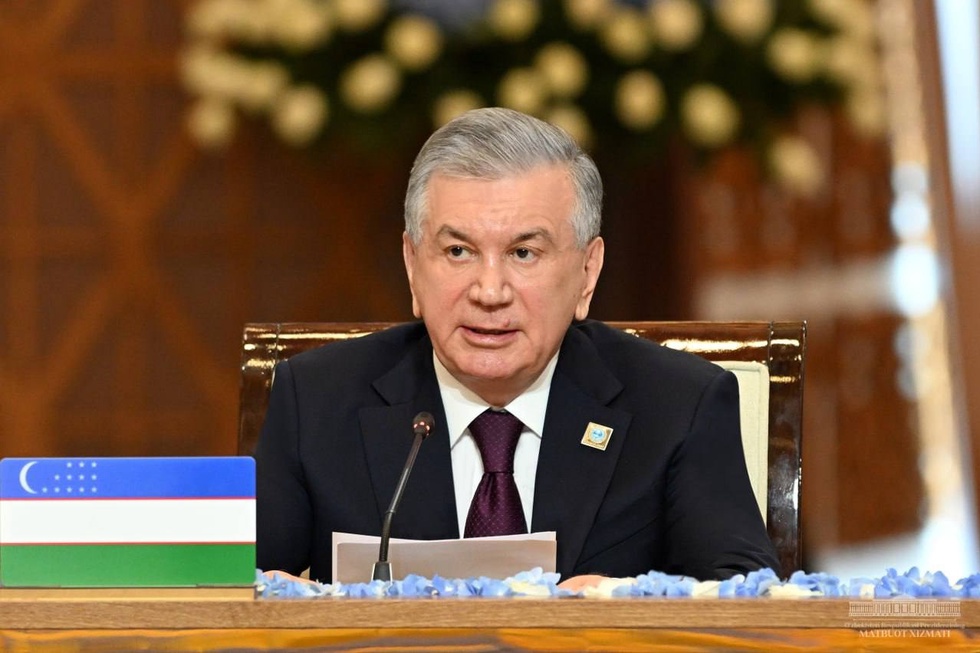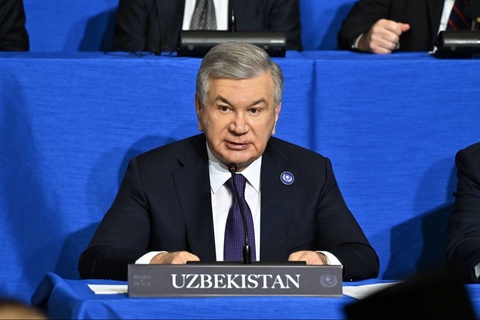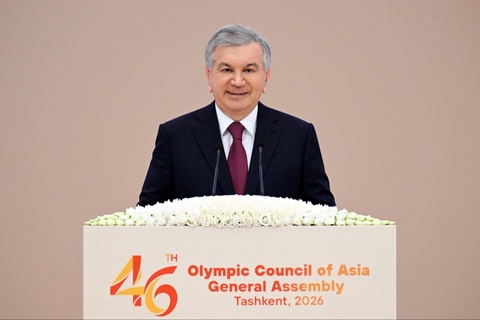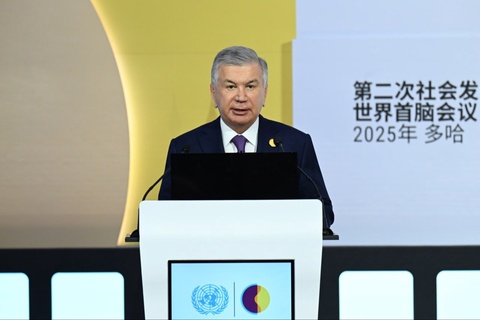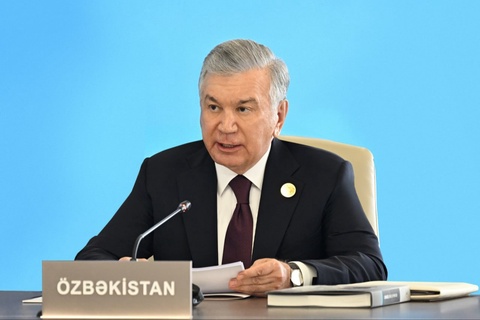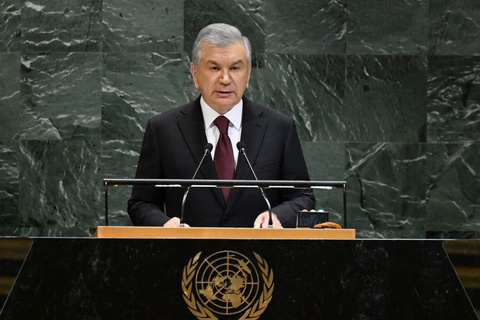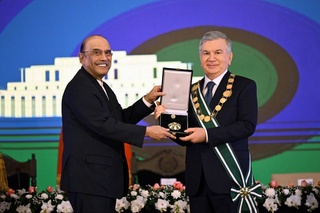I am pleased to welcome all of the participants at the Summit of the Shanghai Cooperation Organization.
I would like to echo the words of appreciation to the President of the Republic of Kazakhstan, esteemed Kassym-Jomart Tokayev, for the warm welcome and excellent organization of our meeting.
I welcome the completion of the procedures for accession of Belarus to the SCO. It will undoubtedly open up additional partnership opportunities.
I sincerely congratulate esteemed Alexander Lukashenko on this occasion.
We highly appreciate the fruitful outcomes of Kazakhstan’s active chairmanship in the Shanghai Cooperation Organization. We support the agenda and draft decisions of today’s meeting.
Dear Heads of Delegations!
This Summit is taking place at a time of escalating international situation.
New destructive conflicts are emerging. The challenges and threats to global and regional security are intensifying.
This is happening against the backdrop of declining mutual trust between states, increased confrontation and rivalry and consequently – increased geopolitical tension.
The norms and principles of international law are increasingly being violated.
Unfortunately, the tools available with the international community have lost their effectiveness in addressing the escalating crises and problems.
In such challenging conditions, it is vital to maintain and further strengthen our commitment to the basic principles of the SCO, which have ensured the Organization’s current success, high international profile, and stabilizing role in international affairs.
We consider it essential to continue:
– Strictly adhering to the fundamental principles of the “Shanghai Spirit” – mutual trust and mutual benefit, equality, respect for cultural diversity, and striving for joint development;
– Upholding the principle of consensus in decision-making, the non-aligned status of the Organization, its openness, non-targeting third countries, equality, and respect for the sovereignty of all members regardless of their economic, military, and political potential.
In today’s realities, it is crucial to ensure that the unity of the SCO is not undermined.
We must further strengthen the cohesion of the “SCO family”, make the most of emerging opportunities, and consistently implement the principle of joint development.
We have all the prerequisites for this. Our countries account for over 40 percent of the world’s population and more than a quarter of global GDP.
Undoubtedly, realizing this colossal potential requires us to create a new model of economic partnership and develop a long-term sustainable development agenda within the SCO framework.
I would like to note that Uzbekistan continues to undergo profound transformations aimed at doubling the size of its economy by 2030, primarily through the development of innovative and high-tech industries, implementation of “green” and digital technologies, as well as a significant increase in the share of renewable energy.
Dear colleagues!
Allow me to briefly address what we believe are the most pressing tasks that the SCO is facing.
First. In the face of an unprecedented global trust deficit, there is an increasing need to find new approaches to ensuring our common security.
Therefore, our Samarkand Solidarity Initiative for Common Security and Prosperity is more relevant than ever today.
We believe that the adoption of the SCO Code of Good Neighborliness, Trust, and Cross-Border Partnership will contribute to strengthening dialogue and further deepening multilateral cooperation in the new realities.
Second. Achieving strategic breakthrough in the economic dimension. Our trade turnover with the member states of the Organization increased by 20 percent last year and by another 15 percent since the beginning of this year.
We believe it is time to develop an Agreement on Trade Facilitation Procedures within the SCO. This could include joint measures to eliminate trade barriers, harmonize technical regulations and certification, and align phytosanitary and veterinary control systems.
Additionally, given the global trend of developing cross-border e-commerce, we propose preparing a Cooperation Program in this area with the integration of existing digital trade platforms.
Third. Supporting industrial cooperation programs. We propose to develop a comprehensive set of measures to stimulate mutual investments, primarily in infrastructure, high-tech industries, and the service sectors.
It is important to consider financial support mechanisms for such projects and revisit the creation of the SCO Development Fund and the SCO Development Bank.
Fourth. The effective development of our countries’ economic potential will be facilitated by the formation of an inclusive transportation system along the “East-West” and “North-South” lines.
I emphasize that the diversification of transport corridors is a crucial condition for the sustainable development of our entire region.
We also propose to develop a Plan for the Digitalization of Logistics Procedures, including organizing electronic data exchange on goods crossing our borders.
Fifth. Expanding state-of-art and reliable energy infrastructure across the SCO space.
In Uzbekistan, we have adopted a large-scale program for the accelerated development of green energy, annually introducing about 2 Gigawatts of solar and wind generation capacity. We have also started working on a project for the industrial production of green hydrogen.
We propose developing a Comprehensive Cooperation Plan to Facilitate Investments and Technology in Renewable Energy.
Sixth. Accelerated digital transformation.
In our view, transitioning to a digital economy, implementing artificial intelligence, and adopting advanced IT solutions are crucial for our countries’ competitiveness.
To exchange knowledge, experiences, and best practices, and to develop systemic IT park interactions, we advocate for the development of the “Future Technologies of the SCO” Program.
Seventh. We propose to consider the adoption of a ‘Roadmap’ for SCO countries’ cooperation in social development and protection.
I am confident that implementing specific tasks to improve living standards and develop territories, particularly rural areas, will contribute to achieving the goals of the Agenda 2030.
Eighth. We believe it is advisable to develop a joint electronic platform of the “SCO Food Security Atlas”. This platform will consolidate data on our countries' agro-industrial potential in terms of produced goods and supply capabilities.
Dear Participants of the Meeting!
It is necessary to continue close coordination of the work of the competent authorities of our countries in combating modern challenges and security threats, including through the SCO Regional Anti-Terrorist Structure.
I would like to address the situation in neighbouring Afghanistan being an integral part of Central Asia, a crucial factor in ensuring regional stability.
The differences in approaches to building relations with the current Afghan authorities are well-known.
I am convinced that maintaining dialogue with Kabul is in the interests of the security and economic development of the entire region. This is becoming increasingly obvious to ever more countries.
In this regard, the proposal to resume the work of the SCO-Afghanistan Contact Group remains relevant.
Dear Heads of Delegations!
Our Summit is taking place in the year of the 20th anniversary of the establishment of the permanent bodies of the SCO – the Secretariat in Beijing and the Executive Committee of the Regional Anti-Terrorist Structure in Tashkent.
In a short period, they have established themselves as effective mechanisms of partnership and have taken a rightful place among multilateral institutions.
We are committed to the process of further development of the SCO and are ready to consider proposals for improving the activities of our Organization.
In conclusion, I would like to join the congratulations to the esteemed Mr. Xi Jinping on the assumption of the chairmanship of the Shanghai Cooperation Organization by the People’s Republic of China.
I once again confirm Uzbekistan’s commitment to further expanding multifaceted partnerships within the SCO.
Thank you for your attention.


